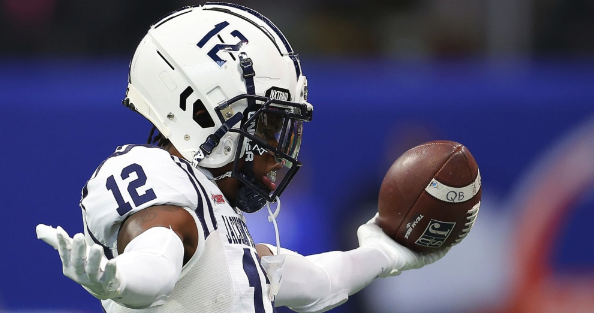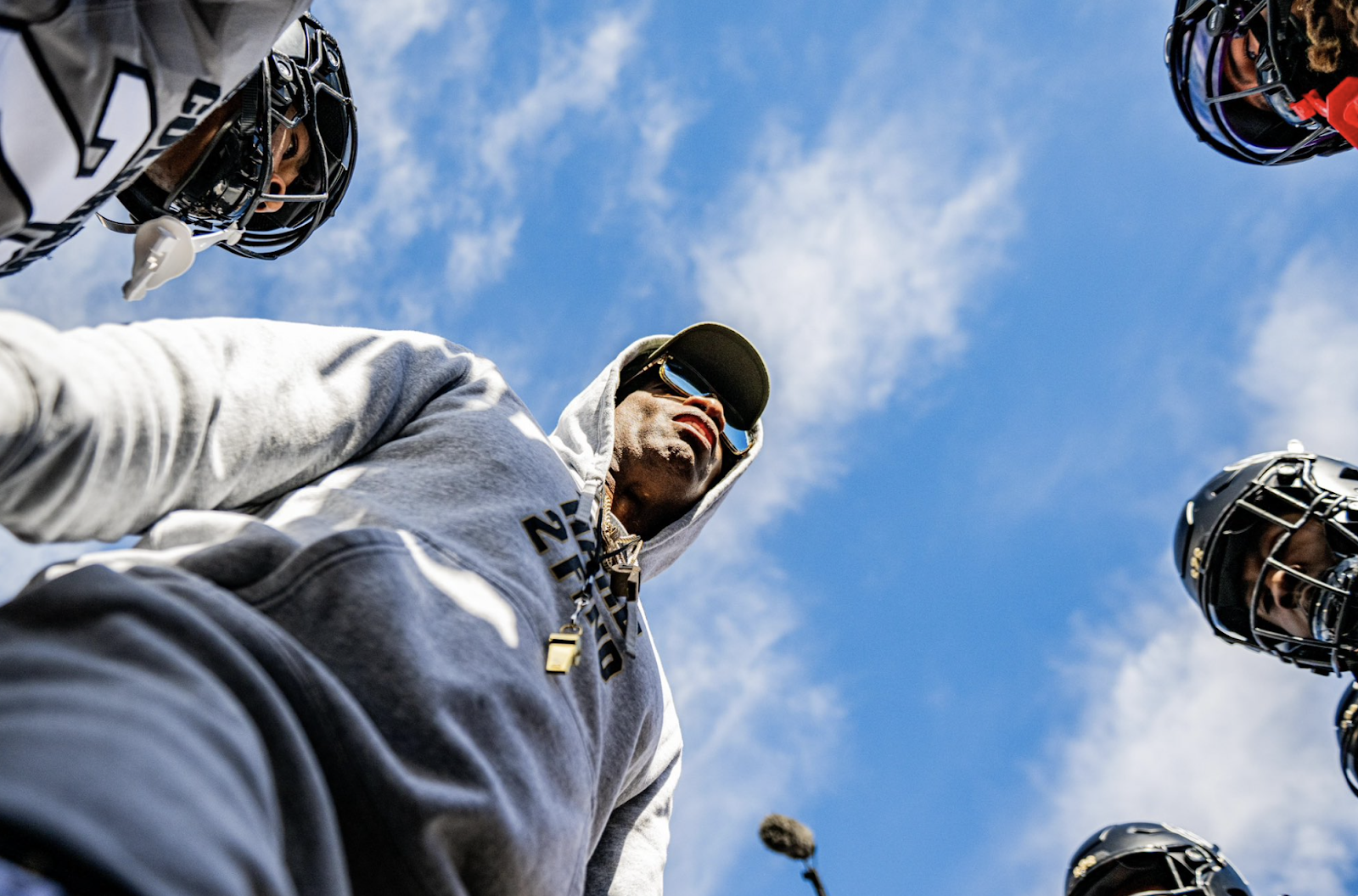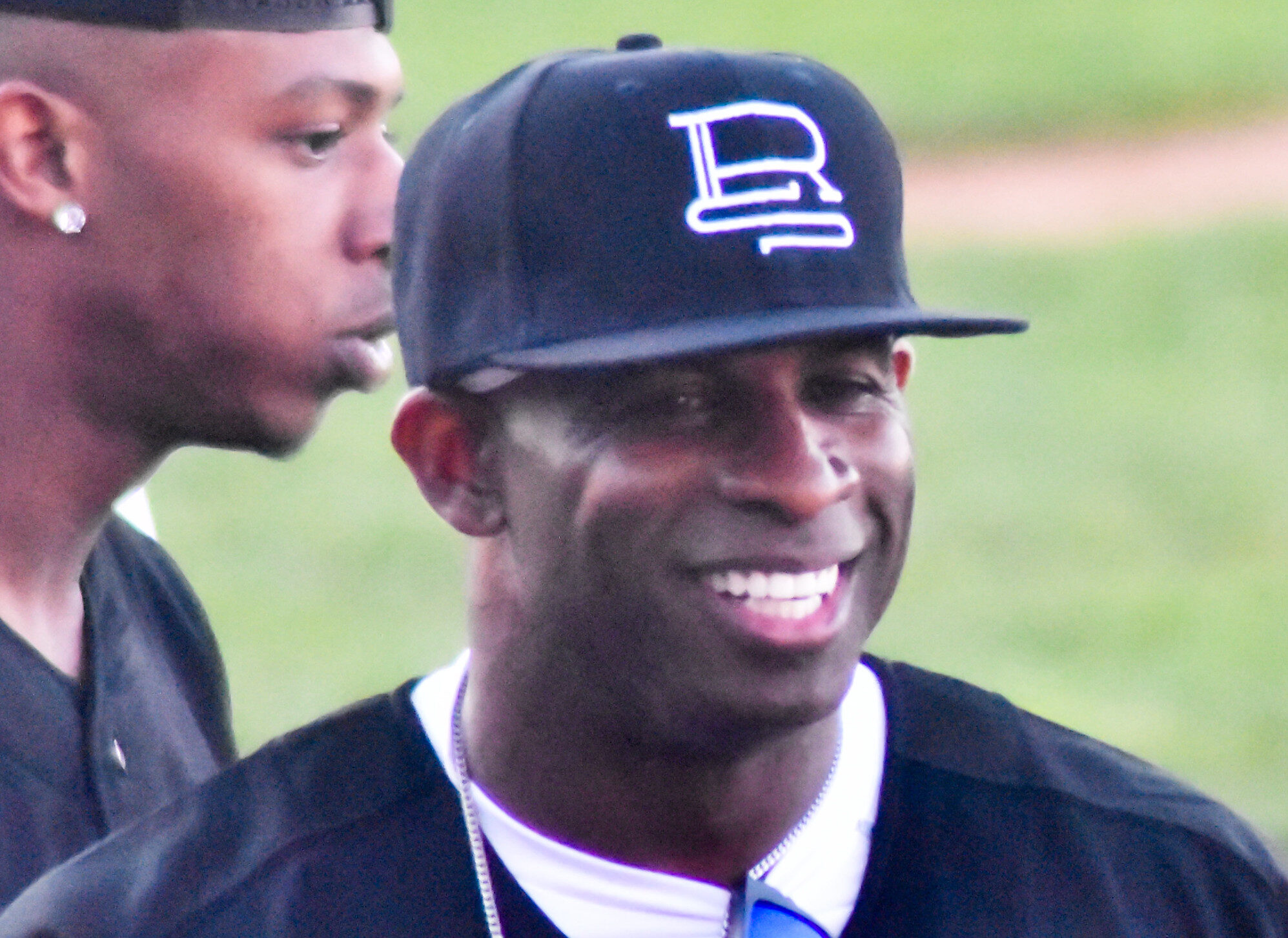Former NFL cornerback Deion Sanders has been making a name for himself in college football. Coach Prime, derived from his nickname “Primetime,” traded the media desk for his first NCAA coaching job in 2020. He started at Jackson State University (JSU) in Mississippi, one of many Historically Black Colleges and Universities (HBCUs) in the United States with a proud tradition of football.
Jackson State isn’t like Alabama, Georgia, or any mega college football program. The college plays in the Southwestern Athletic Conference (SWAC), which is predominantly made up of HBCUs. These schools rarely get the media attention as the big dogs; however, Coach Prime changed that.
Being one of the most media-savvy NFL legends comes with a lot of influence. Sanders brought the media flair with him when he arrived in Jackson, Mississippi.
When he took the job in 2020, Sanders donated half his coaching salary to renovate the Jackson State stadium. He was on a $300,000-a-year salary, lower than some NFL starting salaries.
In 2021, the stadium sold out when Jackson State played their rival, Alcorn State. More than 62,512 people attended the game, bringing more than $1 million in revenue to the Jackson economy. More than $5 million was generated across the whole weekend, with people flocking to local bars and restaurants.
Sanders’s time at Jackson State coincided with a milestone in college athletics. When the Supreme Court ruled in favor of college athletes’ name, image, and likeness rights, it changed how players could market themselves. Schools like Jackson State now had a pipeline to players they never thought they could recruit.
Part of that is having a coach like Sanders. He lured top-five recruit Travis Hunter to Jackson State, a coup for the college football landscape. Hunter had offers from huge college teams and was verbally committed to Florida State, ironically Sanders’s alma mater.
“I want to be part of that history, and more, I want to be part of that future. I am making this decision so that I can light the way for others to follow, make it a little easier for the next player to recognize that HBCUs may be everything you want and more,” Hunter said at the time. He cited NFL legends like Walter Payton and Jerry Rice as inspiration. Payton and Rice are two HBCU legends, too. Payton played his college ball at Jackson State.

Photo Courtesy Travis Hunter
Coach Prime took Jackson State to the Celebration Bowl twice during his time there. This bowl game honors the history of football played between the HBCU winner of the SWAC and the Mid-Eastern Athletic Conference (MEAC). Jackson State played South Carolina State in 2021 and North Carolina Central in 2022. Unfortunately, Jackson State lost both affairs.
The move to coach at an HBCU brought a wave of NFL coaching talent to the ranks. Sanders brought several former NFL coordinators and assistant coaches to JSU. Meanwhile, the football program at Grambling State University hired Hue Jackson, the former Cleveland Browns head coach.
Bigger schools usually hire coaches with that level of experience, but Sanders’s image and media coverage prompted coaches like Jackson to take HBCU jobs. It is not the flashiest and doesn’t have the glamor of the NFL, but it builds connections with players and the school’s surrounding communities.
Sanders wants to see more HBCU representation within the NFL. He has advocated heavily for pro teams to scout at HBCUs and select players in drafts. In the 2023 NFL Draft, only one player from an HBCU was picked. The New England Patriots selected Isaiah Bolden in the seventh round. Conversely, the league took four HBCU players in 2022. Coach Prime has said that the NFL is missing out on the talent in these smaller schools because they are influenced by the mainstream programs.
Even with the NFL establishing an HBCU combine and a Legacy Bowl showcase, Sanders wants to see more representation in the big leagues.
“Twenty-four teams came to witness our kids yesterday in its entirety, and I appreciate you. But there’s 32 teams in this Crayola box,” the coach said on Twitter at the time. “Therefore, the Dolphins, the Broncos, the Texans, the Bills, the Buccaneers, the Ravens, the Panthers, the Browns, the Vikings, and the Eagles, where art thou?”
“You could have sent somebody, man; you could have shown up just a little bit, but I guarantee you that you’re gonna go to Mississippi State and Ole Miss,” he continued. “I guarantee you’re gonna show up there, and I understand, I understand you say they have more talent, I understand. But guess what? We’re comin’.”
Sanders has moved on from Jackson State, though. He took the head coaching job at Colorado University Boulder, one of the blue-chip programs looking for its modern revitalization. Travis Hunter followed his JSU coach, and Coach Prime’s son, Shedeur, is the starting quarterback for the Buffaloes. Since his arrival, Folsom Field in Boulder has sold out a record five times as fans flock to watch Coach Prime and the boys.
Like any head coach, Sanders has his critics. Some writers say he left Jackson State rather quickly when a Power Five school gave him a better offer. Colorado is not Alabama, but it has more resources than Jackson State. He has been outspoken about being a Black head coach and his signature look. He talks trash publicly; sometimes, the Buffaloes can’t back it up. Not to mention, a litany of JSU players joined him at Colorado.

Photo Courtesy Colorado Buffaloes Football
Yet even some of Sanders’s detractors see that his legacy was more positive than negative.
“Sanders was right about the spotlight’s knack for finding him. It didn’t matter if he was peddling insurance in TV adverts with Bama’s Nick Saban or getting stiff-armed out of a post-game shug; little of what Sanders did at Jackson State went unnoticed,” Andrew Lawrence wrote in The Guardian. “That he was also so generous about sharing his attention with the young Black men and women at Jackson State only further set him apart…”
Coach Prime did bring more awareness to college football programs that now get airtime on ESPN+’s streaming schedule. He stimulated the Jackson, Mississippi, economy with his presence. He sold out JSU games and helped repair a stadium needing renovation. He started a wave of NFL coaches taking their talents to the lesser-known corners of the U.S. Through it all, he only lost five games between 2020 and 2022.
Even though Sanders has traded Jackson for Boulder, he left behind a legacy of success. More moves have been made in light of his time at JSU. The SWAC signed a historic media rights deal with an HBCU streaming service, HBCU GO. CBS-owned TV stations will be allowed to broadcast games, directly resulting from Sanders’s influence. More than $120 million will be paid to the SWAC across 10 years.
While it may seem like pennies compared to the Big 10 or SEC’s multi-billion dollar deals, this is a significant win for HBCUs. Awareness needs to continue to grow for more players like Travis Hunter to turn down Florida State for Jackson State.





